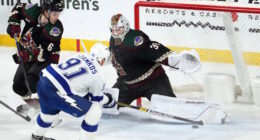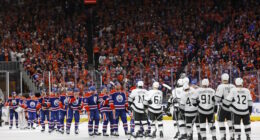Tim Panaccio of CSNPhilly: According to anonymous governors, Gary Bettman will ask them on September 13th to vote to lock the players out if a new long-term CBA is not signed. Gary Bettman last Friday,
“Somebody needs to be in a position to offer or say something new,” Bettman said last Friday about how to gain some traction in the talks.
“And considering that we made such a large move , to have gotten the response that we got is disappointing.”
Renaud Lavoie via twitter: Sources say the NHL is losing significant money as a whole. One source said the league has lost $240 million in the last 2 years. The NHLPA doesn’t agree with the NHL losses info, and are proposing a system that would address issues that some teams face.
Pierre LeBrun of ESPN: Two sources have said that the NHL has proposed moving the start of free agency from July 1st to July 10th.
Chuck Gormley of CSNWashington: Alex Ovechkin talks about the CBA and possible lockout.
On the players’ plan to help struggling NHL teams: “We want to help teams that financially are not that good and the league knows it. They tell what they want and think that cutting our salaries and our contract years is going to help that. Why are they still signing guys for 10 years and not five years? It’s strange and they look stupid. They right now say they want to cut salary and everything. Lots of guys just won’t come back if this happens.
On players being asked to give back a percentage of their salaries: “It’s not fair for us. They still make money. They still sell tickets and they have money. Why they sign us to long-term deals and that kind of money and when the CBA is done they want to cut our salary? Why do they want to cut 20 percent? If they’re going to cut a percentage of the contracts and years, I don’t think lots of guys who sign American deals are going to come back and play here. It’s not reasonable to be here. You have to think of your future. You have to think of your family.”
On if he thinks players would leave the NHL and never come back: “Yeah, Why not?”
On if he would consider leaving the NHL if his contract was reduced by 15 or 20 percent: “I’m going to think about it, but I hope not. It’s something the league wants for all the players. Crosby just signed, Suter, Weber just signed huge deals. They want to cut 24 percent for nothing? I don’t think it’s fair enough.”
NHLPA.com: The NHLPA separates myth from fact:
Myth: Gary Bettman and the NHL owners have made a “meaningful and significant” alteration to their first proposal.
Fact: Under the NHL owners’ first proposal the players’ share of Hockey Related Revenue (HRR) would fall from 57% from 43%. This is a payroll reduction of $460M, or 24%, on 2011/12 numbers. Their second proposal would reduce the player share to 46% of HRR, or “only” 19.3%.
This is the equivalent of the NHLPA making a proposal seeking 71% of HRR (mirroring the decrease in the owners’ proposal) and then making a second proposal seeking “only” 68% of HRR. Should that be treated as a “significant” and “meaningful” move in the owners’ direction worth more than $400 million?
Of course not. Nor should the owners’ proposal. The owners have made no concessions. Every part of their proposal is much more favorable to them than the current agreement. A concession is when you give up something you have, not limiting by a small amount that which you want but don’t have.
The players, on the other hand, have made real concessions in order to reach an agreement.
Myth: Gary Bettman said about a potential lockout: “Both sides have to bear responsibility. Whether it’s a strike or a lockout, it makes zero difference.”
Fact: A lockout is very much a choice; no law compels a lockout. The owners seem intent on making that choice, and doing so at the first possible moment. They have experience in locking the players out: this will be the 3rd consecutive lockout since Bettman became NHL Commissioner.) The players have not even considered a strike.
The law allows for the season to start on time under the terms of the existing CBA so long as both sides are willing to do so. The players are willing to continue to negotiate and also continue to work until a deal is reached that is fair to both sides. The owners’, apparently are not so willing. If training camps and the 2012-13 NHL season do not start on time, it will be the owners’ decision and their decision alone.
Myth: Gary Bettman says of revenue sharing: “It is a non-issue… a distraction.”
Fact: Meaningful revenue sharing is an essential component of any successful league. It is not a distraction; it is the heart of the issue.
After seven straight seasons of record revenue, it’s clear that if the NHL has a problem, it is not a revenue issue, but rather a revenue disparity issue. The owners’ revenue sharing proposal does increase revenue sharing somewhat, but every dollar of revenue sharing is paid for by player salary reductions; the higher income clubs contribute nothing on their own.
The Players’ propose that they partner with the high-income teams to provide targeted funding for the distressed teams and owners. But the players won’t and shouldn’t have to do this alone. The higher income teams need to share far more with the lower revenue teams. The Players will do their part; will the owners?
Myth: The NHL maintains that the starting point for these negotiations is that the owners’ should be “paying less to the players.”
Fact: Why? When Gary Bettman and the owners cancelled the entire 2004-05 season to institute a salary cap, they also rolled-back player salaries by 24% across the board. Despite those massive concessions (billions of dollars over the life of the current CBA) and with revenues now more than $ 1 Billion per year more than before the lockout, the NHL wants to massively reduce salaries yet again.
What is the rationale? Where would the savings go? No answers have been made to these questions; simply a statement that they want to pay less. That is no surprise. Every employer in every industry wants to do that.
Moreover, since the lockout, the owners have done nothing to address the rapid escalation in non-player costs, which have risen at a far higher rate than the players’ share. To date there has been no proposal or even any stated willingness to constrain these costs, or, indeed, to limit or reduce any costs other than what goes to the players.
Players are offering real concessions, worth about $450 M over the next three years if the NHL grows at the rate it has the last several year, and perhaps nearly double that if it grows at the rate of the last two seasons. The players are willing to do their part, but are not willing to have salaries simply reduced so that they do not share in the growth of the sport. The high revenue teams need to step up to help the lower revenue clubs as well.



